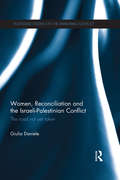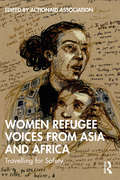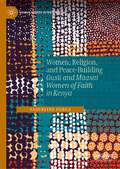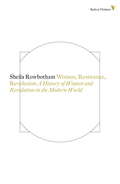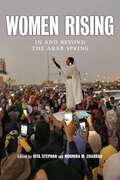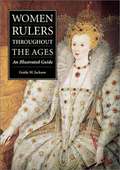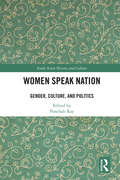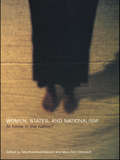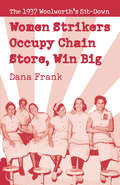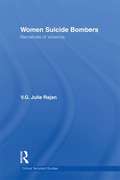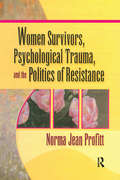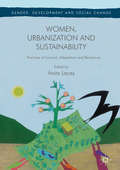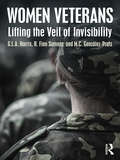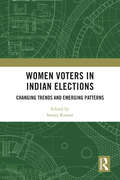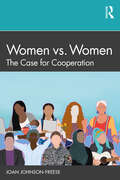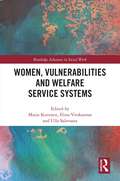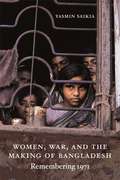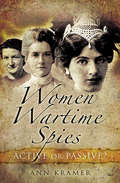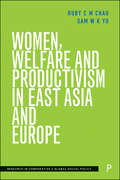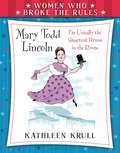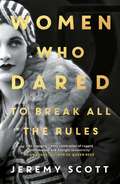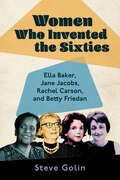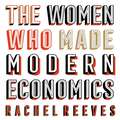- Table View
- List View
Women, Reconciliation and the Israeli-Palestinian Conflict: The Road Not Yet Taken (Routledge Studies on the Arab-Israeli Conflict)
by Giulia DanieleWomen, Reconciliation and the Israeli-Palestinian Conflict explores the most prominent instances of women’s political activism in the occupied Palestinian territories and in Israel, focussing primarily on the last decade. By taking account of the heterogeneous narrative identities existing in such a context, the author questions the effectiveness of the contributions of Palestinian and Israeli Jewish women activists towards a feasible renewal of the ‘peace process’, founded on mutual recognition and reconciliation. Based on feminist literature and field research, this book re-problematises the controversial liaison between ethno-national narratives, feminist backgrounds and women’s activism in Palestine/Israel. In detail, the most relevant salience of this study is the provision of an additional contribution to the recent debate on the process of making Palestinian and Israeli women activists more visible, and the importance of this process as one of the most meaningful ways to open up areas of enquiry around major prospects for the end of the Israeli-Palestinian conflict. Tackling topical issues relating to alternative resolutions to the Israeli-Palestinian conflict, this book will be a valuable resource for both academics and activists with an interest in Middle East Politics, Gender Studies, and Conflict Resolution.
Women Refugee Voices from Asia and Africa: Travelling for Safety
by ActionAid AssociationThis book presents experiences of women refugees in a variety of contexts across Asia and Africa and builds a framework to ensure robust and effective mechanisms to safeguard refugees’ rights. It highlights the structural challenges that women who are forcibly displaced face and the inadequacies of the response of governments and other stakeholders, irrespective of the country of origin, ethnicity, and religion of the refugee community. This volume: ● Focuses on contemporary issues such as the Rohingya and the Syrian crisis. ● Brings first-person accounts of women refugees from Asia and Africa. ● Draws on an interdisciplinary approach to analyse a host of issues, including public policy, cultural norms, and economics of forced migration. Bringing together first-hand accounts from women refugees and interventions by activists, academics, journalists, filmmakers, humanitarian workers, and international law experts, this book will be a must read for scholars and researchers of migration and diaspora studies, development studies, sociology and social anthropology, and politics and public policy. It will be of special interest to NGOs, policymakers, and think tanks.
Women, Religion, and Peace-Building: Gusii and Maasai Women of Faith in Kenya (Human Rights Interventions)
by Jaqueline OgegaThis book explores the peacebuilding ideas and experiences of Maasai and Gusii women of faith in Kenya. Women of faith across the world have long demonstrated their leadership in peacebuilding. They have achieved this despite their underrepresentation in formal peacebuilding systems and the persistent lack of consideration for their critical contributions, and in the face of insecurity and violence against their very bodies. Their efforts include daily practices of sharing resources, building social cohesion, promoting human relations, and interlinking psychological, social, political, and spiritual encounters. This book provides a gender-responsive peacebuilding framework that leverages the intersectionality of women’s diverse identities and roles as they navigate both secular and religious spaces for peace. The book will appeal to researchers and teachers as well as practitioners and activists.
Women, Resistance and Revolution
by Sheila RowbothamThis classic book provides a historical overview of feminist strands among the modern revolutionary movements of Russia, China and the Third World. Sheila Rowbotham shows how women rose against the dual challenges of an unjust state system and social-sexual prejudice. Women, Resistance and Revolution is an invaluable historical study, as well as a trove of anecdote and example fit to inspire today's generation of feminist thinkers and activists.
Women Respond to the Men's Movement: A Feminist Collection
by Kay L. HaganWomen are paying attention to the men's movement. Some like what they see and hope that men at last are coming to terms with the realities of true partnership and shared power. Others are downright skeptical about the chorus of "whining white men".
Women Rising: In and Beyond the Arab Spring
by Rita Stephan Mounira M. CharradGroundbreaking essays by female activists and scholars documenting women’s resistance before, during, and after the Arab SpringImages of women protesting in the Arab Spring, from Tahrir Square to the streets of Tunisia and Syria, have become emblematic of the political upheaval sweeping the Middle East and North Africa. In Women Rising, Rita Stephan and Mounira M. Charrad bring together a provocative group of scholars, activists, artists, and more, highlighting the first-hand experiences of these remarkable women. In this relevant and timely volume, Stephan and Charrad paint a picture of women’s political resistance in sixteen countries before, during, and since the Arab Spring protests first began in 2011. Contributors provide insight into a diverse range of perspectives across the entire movement, focusing on often-marginalized voices, including rural women, housewives, students, and artists. Women Rising offers an on-the-ground understanding of an important twenty-first century movement, telling the story of Arab women’s activism.
Women Rulers Throughout the Ages: An Illustrated Guide
by Guida M. Jackson-LauferAlphabetically from Absh Khatun, 13th century Queen of Persia, to Dr. Sibongile Zungu, chief in 1993 of the South African Madlebe Tribe, independent scholar Jackson updates her book Women Who Ruled by adding those who have served in the last decade. The volume includes entries running from a paragraph to three pages a useful geographical chronology by century and b&w representations of rulers from Carthage's legendary founder Dido to Jenny Shipley, New Zealand's Prime Minister since 1997. Includes some powers behind the throne like Diane de Poitiers but not Marie Antoinette or Eva Peron.
Women Speak Nation: Gender, Culture, and Politics (South Asian History and Culture)
by Panchali RayWomen Speak Nation underlines the centrality of gender within the ideological construction of nationalism. The volume locates itself in a rich scholarship of feminist critique of the relationship between political, economic, cultural, and social formations and normative gendered relations to try and understand the cross-currents in contemporary feminist theorizing and politics. The chapters question the gendered depictions of the nation as Hindu, upper caste, middle class, heterosexual, able-bodied Indian mother. The volume also brings together interviews and short essays from practitioners and activists who voice an alternative reimagining of the nation. The book will be of great interest to scholars and researchers of gender, politics, modern South Asian history, and cultural studies.
Women, States and Nationalism: At Home in the Nation?
by Sita Ranchod-Nilsson Mary Ann TétreaultWomen, States and Nationalism counters this attitude and examines the many and contradictory ways in which women negotiate their places in 'the nation'. The volume includes theoretical essays that explore the multiple ways in which the very concept of 'nation' is based upon notions of family, sexuality and gender power which are often overlooked of downplayed by 'male-stream' scholarship. It gathers together an outstanding panel of feminist scholars and area studies specialists, who, through a series of focused case studies, analyse diverse issues which include;*gender and sectarian conflict in Northern Ireland*the paradox of Israeli women soldiers*women, civic duty and the military in the USA*the Hindu Right in India*power, agency and representation in Zimbabwe*political identity and heterosexism.This timely volume is a highly valuable resource for students and scholars of Nationalism, Internationalism Studies and Women's Studies.
Women Strikers Occupy Chain Stores, Win Big
by Dana Frank"Frank does an excellent job of creating articulate arguments out of a complex blend of history, economics, and current events."--Library Journal Woolworth's was the Walmart of the 1930s. The women were exploited and sexually harassed. This is the exciting story of how they fought back against corporate exploitation and oppression.
Women Suicide Bombers: Narratives of Violence (Routledge Critical Terrorism Studies)
by V. G. RajanThis book offers an evaluation of female suicide bombers through postcolonial, Third World, feminist, and human-rights framework, drawing on case studies from conflicts in Palestine, Sri Lanka, and Chechnya, among others. Women Suicide Bombers explores why cultural, media and political reports from various geographies present different information about and portraits of the same women suicide bombers. The majority of Western media and sovereign states engaged in wars against groups deploying bombings tend to focus on women bombers' abnormal mental conditions; their physicality-for example, their painted fingernails or their beautiful eyes; their sexualities; and the various ways in which they have been victimized by their backward Third World cultures, especially by "Islam." In contrast, propaganda produced by rebel groups deploying women bombers, cultures supporting those campaigns, and governments of those nations at war with sovereign states and Western nations tend to project women bombers as mythical heroes, in ways that supersedes the martyrdom operations of male bombers. Many of the books published on this phenomenon have revealed interesting ways to read women bombers' subjectivities, but do not explore the phenomenon of women bombers both inside and outside of their militant activities, or against the patriarchal, Orientalist, and Western feminist cultural and theoretical frameworks that label female bombers primarily as victims of backward cultures. In contrast, this book offers a corrective lens to the existing discourse, and encourages a more balanced evaluation of women bombers in contemporary conflict. This book will be of interest to students of terrorism, gender studies and security studies in general.
Women Survivors, Psychological Trauma, and the Politics of Resistance
by Norma Jean ProfittUnderstand how women survivors of abuse have become empowered to work for social change and help others!This one-of-a-kind book explores the processes through which women survivors of abuse can transform psychological trauma into a politics of resistance and become involved in collective action for social change. Women Survivors, Psychological Trauma, and the Politics of Resistance uses the powerful testimony of survivors to reveal the processes, factors, insights, and conditions that prompted these women to join in the collective struggle opposing violence against women and children.Unlike other books that only examine the empowerment strategies that women employ to leave abusive relationships, this essential book is a unique, in-depth exploration of the social and psychological processes of survivors’empowerment. This book traces how these processes unfold, showing how women have made sense of their lives and became involved in action for social change.In this unique book, you will discover: how the transition house movement came about and how its practices were conceived and shaped how women survivors have learned to recognize “invisible” conflicts and contradictions in their lives new directions for feminist social work research the barriers that stand in the way of building communities dedicated to healing, action, and change how the involvement of survivors themselves can help to recreate shelters and women's organizations as settings for the collective struggle against violence which currently used remedies for woman/child abuse need to be reexamined . . . and much more!Containing qualitative studies of eleven women, analysis of their abusive experiences, and suggestions for new social work models to help survivors of abuse, Women Survivors, Psychological Trauma, and the Politics of Resistance will assist you in developing improved techniques from a feminist social work perspective to provide help to abused women.
Women, Terrorism, and Trauma in Italian Culture
by Ruth GlynnAddressing cultural representations of women's participation in the political violence and terrorism of the Italian anni di piombo ('years of lead', c. 1969-83), this book conceptualizes Italy's experience of political violence during those years as a form of cultural and collective trauma.
Women, Urbanization and Sustainability
by Anita LaceyThis work considers the city as a gendered space and examines women’s experiences and engagement in both urbanization and sustainability. Such a focus offers distinctive insights into the question of what it means for a city to be sustainable, asking further how sustainability needs to work with gender and the gendered lives of cities’ inhabitants. Vitally, it considers women’s lives in cities and their work to forge more sustainable cities through a wide variety of means, including governmental, non-governmental and local grassroots and individual efforts towards sustainable urban life. The volume is transnational, offering case-studies from a wide range of city sites and sustainability efforts. It explores crucial questions such as the gendered nature and women’s experiences of current urbanization; the gendered nature of urban sustainability thinking and programmes; and local alternatives and resistances to dominant modes of addressing urbanization challenges.
Women Veterans: Lifting the Veil of Invisibility
by G.L.A. Harris R. Finn Sumner M.C. González-PratsWomen who fight in wars also have to fight for their right to do so. But what are the obstacles impeding their progress in achieving equal status as both active service members and as veterans? This book, written by a team of female veterans and military scholars, demonstrates the ways in which women service members and veterans experience a unique set of challenges when attempting to both honorably serve their country and reintegrate into civilian society following military service. These challenges include – but are not limited to – discrimination, staggering rates of suicide, and barriers to obtaining treatment for military sexual trauma and other critical benefits through the U.S. Department of Veterans Affairs. Women Veterans: Lifting the Veil of Invisibility examines current service-related policies and gender in the military’s hierarchical power structure. Here, a confluence of white male privilege and entitlement, the culture of domination, and the effeminization of the enemy manifest themselves as a backlash against women, calling into question a woman’s agency and her very status as a citizen. Special attention in the book is paid to the civil-military divide, representative bureaucracy, and the function of the military and civilian justice systems. Moreover, the need for appropriate healthcare policies and structures is examined within a ‘wicked problems’ framework. The authors conclude that the responsibility for women veterans, and all veterans for that matter, must become a matter of compelling government interest. This ground-breaking book is required reading for practitioners of public policy and administration with an interest in military and veterans affairs, public health, NGOs and activist groups, as well as scholars of gender and public service, public personnel management, and nonprofit management.
Women Voters in Indian Elections: Changing Trends and Emerging Patterns
by Sanjay KumarThis book looks at different dimensions of political participation of women voters in India. Elections in India have witnessed an increasing electoral participation of women, both as political actors and as voters. Taking note of this positive development, the book looks at what has contributed to this increased turnout among women voters in Indian elections and discusses in detail the factors that facilitate or hinder this participation. Drawing on empirical data from 11 Indian states, it looks at key issues like the voting behaviour and political activities of Indian women; individual and motivational factors affecting participation; the political socialization of women at home; the role of internalized patriarchy and political opinions; along with the challenges faced by women in attaining representation in Indian politics. An important contribution in the study of voting patterns, this book will be indispensable to scholars and researchers of political studies, women’s studies, gender studies, sociology, Indian politics, political sociology, voting behaviour and South Asian studies. It will also be useful for journalists and activists.
Women vs. Women: The Case for Cooperation
by Joan Johnson-FreeseWomen vs. Women is a book about power dynamics and competition between women. The author argues that women have been mired in competitive quicksand since the beginning of time, often beginning in earnest during adolescence, to their social, economic, and political detriment. Exacerbating differences between women has become a strategy for maintaining male-dominated power structures, so – while competition will always exist and can at times be useful – self-inflicted and counterproductively imposed competition between women must end, as it dilutes their power and opportunities. From a security perspective, gender inequality is a destabilizing societal force. This book represents a confluence of ideas. First, the ill effects of gender inequality from the individual to the national and global level (and the fact that this is far from being universally recognized and addressed). Second, the negative influence of extremes, especially political and religious, on society at large and women in particular. Third, the societal stresses imposed on girls and the subsequent lifetime effects. While the challenges of careers, motherhood and old age are all significant for women, the author contends that how they handle these challenges can be shaped by adolescent experiences. As a multidisciplinary work, this book is intended as a supplementary text in undergraduate and graduate courses on American politics, American foreign policy, gender and diversity studies, global studies, sociology, security studies, culture-focused courses, economics and religion. It will also interest general audiences increasingly eager to understand the dynamics of the world they live in.
Women, Vulnerabilities and Welfare Service Systems (Routledge Advances in Social Work)
by Marjo Kuronen Elina Virokannas Ulla SalovaaraThis book studies welfare systems in Europe and beyond from the standpoint of women in vulnerable positions in society. These systems are under major transformations with new models of service delivery and management, austerity measures, requirements for cost-effectiveness, marketization, and the prioritization of services. Divided into three parts: Welfare service systems (not) responding to vulnerable situations of women Women’s encounters with the welfare service system Contradictions of informal support this book considers the experiences and encounters with the service system of women in poverty, homeless women, women with substance use problems, women sentenced of crime, girls and young women in care, and refugees and asylum-seeking women. Drawing upon research and critical discussions from Finland, Canada, Israel, Slovenia, Spain and the UK, this book provides new empirical findings and critical insights, and a valuable resource for the academics and students in social work, social policy, sociology and gender studies, but also for policy makers and professionals in social and health care.
Women, War, and the Making of Bangladesh: Remembering 1971
by Yasmin SaikiaFought between India and what was then East and West Pakistan, the war of 1971 led to the creation of Bangladesh, where it is remembered as the War of Liberation. For India, the war represents a triumphant settling of scores with Pakistan. If the war is acknowledged in Pakistan, it is cast as an act of betrayal by the Bengalis. None of these nationalist histories convey the human cost of the war. Pakistani and Indian soldiers and Bengali militiamen raped and tortured women on a mass scale. In Women, War, and the Making of Bangladesh, survivors tell their stories, revealing the power of speaking that deemed unspeakable. They talk of victimization--of rape, loss of status and citizenship, and the "war babies" born after 1971. The women also speak as agents of change, as social workers, caregivers, and wartime fighters. In the conclusion, men who terrorized women during the war recollect their wartime brutality and their postwar efforts to achieve a sense of humanity. Women, War, and the Making of Bangladesh sheds new light on the relationship among nation, history, and gender in postcolonial South Asia.
Women Wartime Spies: Active or Passive?
by Ann Kramer&“A thrilling, challenging and educational book . . . examines the roles of spies such a Edith Cavell, Mata Hari, Violette Szabo and Noor Inayat Khan&” (Pennant Magazine). Women spies have rarely received the recognition they deserve. They have often been trivialized and, in cinema and popular fiction, stereotyped as vamps or dupes. The reality is very different. As spies, women have played a critical role during wartime, receiving and passing on vital information, frequently at considerable risk. Often able to blend into their background more easily than their male counterparts, women have worked as couriers, transmitters, and with resistance fighters, their achievements often unknown. Many have died. Ann Kramer describes the role of women spies during wartime, with particular reference to the two world wars. She looks at why some women chose to become spies, their motives, and backgrounds. She looks at the experience of women spies during wartime, what training they received, and what skills they needed. She examines the reality of life for a woman spy, operating behind enemy lines, and explores and explodes the myths about women spies that continue until the present day. The focus is mainly on Britain but also takes an international view as appropriate. &“Tells the often surprising stories of some of the women who chose to become spies and to serve their country . . . An excellent work.&” —The Great War Magazine
Women, Welfare and Productivism in East Asia and Europe (Research in Comparative and Global Social Policy)
by Ruby Chau Sam YuDeveloping the new framework of ‘life-mix’, which considers the mixed patterns of caring and working in different periods of life, this book systematically explores the interplay of productivism, women, care and work in East Asia and Europe. The book ranges across four key aspects of welfare — childcare, parental leave, employment support and pensions — to illustrate how policies affect women in various periods of their lives. Policy case studies from France, Germany, Hong Kong, Hungary, South Korea, Sweden and the UK, show how welfare could support people’s caring and working lives. This book forms a prescient examination of how productivist thinking underpins regimes and impacts women’s welfare, care and work in both the East and West.
Women Who Broke the Rules: Mary Todd Lincoln
by Kathleen Krull"Well-behaved women seldom make history." --Laurel Thatcher Ulrich <P><P>Women Who Broke the Rules celebrates the bold and brave women who have forged their own paths--breaking rules along the way--to help shape our country's past, present, and future. Acclaimed author Kathleen Krull blends history and humor in this accessible young biography series. Mary Todd Lincoln had a unique and determined, if sometimes erratic, personality that made her one of the most memorable First Ladies. Although she was born and raised in the South, she staunchly supported her husband's quest to save the Union and she strictly supported his policies. She was also an advocate for our veterans, and she would often bring flowers and food to wounded soldiers in the hospital and even write letters for them to their loved ones. No matter what criticism or personal hardships she faced, including witnessing her husband's assassination, she remained steadfastly loyal to her country. Lexile Measure: 880
Women Who Dared: To Break All the Rules
by Jeremy ScottVictoria Woodhull, Mary Wollstonecraft, Aimee Semple McPherson, Edwina Mountbatten, Margaret Argyll and Chanel were all women who dared. They had no time for what society said they could and couldn&’t do and would see the world bend before they did. In 1872 a mesmerising psychic named Victoria Woodhull shattered tradition by running for the White House. Had she won the ensuing spectacle would surely have rivalled that of our own era. Abhorring such flamboyance, Mary Wollstonecraft inspired a revolution of thought with her pen as she issued women&’s first manifesto – still to be fulfilled. From Aimee Semple McPherson, the first female preacher in America, to Coco Chanel, designer of an empire, these women became the change they wanted to see in society. In Women Who Dared, Jeremy Scott pays tribute to them all with wit, verve and reverence.
Women Who Invented the Sixties: Ella Baker, Jane Jacobs, Rachel Carson, and Betty Friedan
by Steve GolinWhile there were many protests in the 1950s—against racial segregation, economic inequality, urban renewal, McCarthyism, and the nuclear buildup—the movements that took off in the early 1960s were qualitatively different. They were sustained, not momentary; they were national, not just local; they changed public opinion, rather than being ignored. Women Who Invented the Sixties tells the story of how four women helped define the 1960s and made a lasting impression for decades to follow. In 1960, Ella Baker played the key role in the founding of the Student Nonviolent Coordinating Committee, which became an essential organization for students during the civil rights movement and the model for the antiwar and women’s movements. In 1961, Jane Jacobs published The Death and Life of Great American Cities, changing the shape of urban planning irrevocably. In 1962, Rachel Carson published Silent Spring, creating the modern environmental movement. And in 1963, Betty Friedan wrote The Feminine Mystique, which sparked second-wave feminism and created lasting changes for women. Their four separate interventions helped, together, to end the 1950s and invent the 1960s.Women Who Invented the Sixties situates each of these four women in the 1950s—Baker’s early activism with the NAACP and the Southern Christian Leadership Conference, Jacobs’s work with Architectural Forum and her growing involvement in neighborhood protest, Carson’s conservation efforts and publications, and Friedan’s work as a labor journalist and the discrimination she faced—before exploring their contributions to the 1960s and the movements they each helped shape.
The Women Who Made Modern Economics
by Rachel ReevesA powerful call to put the women back into economics and embrace a better future for all.THE WOMEN WHO MADE MODERN ECONOMICS tells the story of the women who for too many years have been locked out of the economy with negative consequences for them and for society as a whole. Economic thinking has also largely ignored what women have to offer, marginalising the work of female economists or simply not recognising their achievements. As a woman and economist who is herself challenging those barriers, Rachel Reeves has written a passionate, powerful and inspiring book dedicated to the women who have gone before and to those who will change the future. Drawing on her personal experiences and relating them to the work of women past and present who are often overlooked, Reeves explores the ideas of theorists such as Harriet Martineau, Mary Paley Marshall and Joan Robinson but also the contributions of policy makers such as Janet Yellen, Gita Gopinath and Christine Lagarde. Throughout, she outlines her vision for the future of the economy if she does become the first female Chancellor of the UK, a future in which productivity is enhanced, growth is sustainable and there are opportunities for all, not just a privileged elite.(P) 2023 Hodder & Stoughton Limited
